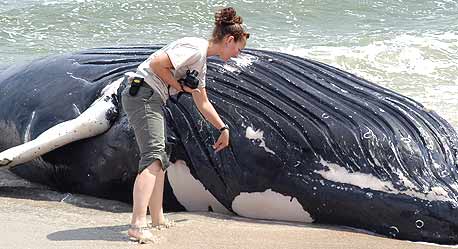|
Heather Batson, a University of Central Florida intern at the Canaveral National Seashore, examines a 32-foot-long Humpback whale Thursday near a crossover on Apollo Beach. The cause of the whale's death is unknown.
Unknown what caused Humpback death
By Jim Waymer
FLORIDA TODAY
CANAVERAL NATIONAL SEASHORE — Biologists will examine the carcass of a 32-foot humpback whale today that washed up Thursday at the northernmost region of the park -- if it's still there.
It's thought to be the third humpback found dead along east Central Florida beaches in five weeks.
Humpbacks are federally listed as an endangered species. There are believed to be about 15,000 to 20,000 left in the wild.
Fishermen found the latest whale rolling in the surf at the park's Apollo Beach area.
"This is rare for us here," said Christin Pool, a guide at the park. Judging by how decomposed it was, Pool guessed the whale had died at sea before drifting in. "It's been dead for a few days, floating out there. I don't think it beached itself and died," she said.
The whale had no visible wounds, she said, other than a few scuffs from rolling in the sand.
Biologists attached ropes with sand buckets to the whale to hold it in place until a team of scientists can perform a necropsy, an autopsy of an animal.
"The danger is that the rope will snap and it will wash out," said Megan Stolen, a biologist with Hubbs-SeaWorld Research Institution in Fort Pierce.
"There's nothing externally that shows any problem yet," Stolen said.
The whale will be buried at the beach.
Stolen also helped bury a 33-foot humpback found Feb. 17 on Canova Beach. No cause of death could be determined because that whale was too decomposed. A tall wooden cross and circle of rocks now mark its grave near the dune.
On Saturday, a vessel reported a 40-foot humpback whale floating dead 40 miles offshore from Cape Canaveral. Biologists surveying for endangered right whales confirmed the report, but the whale was too far out to be towed in, said Jenny Litz, assistant stranding response coordinator for the National Marine Fisheries Service in Miami. Litz said that whale was larger and much more decomposed than the one found Thursday. It was also floating out to sea.
"We really can't say for sure, but we think it's highly unlikely that it's the same animal," she said.
Top
|
